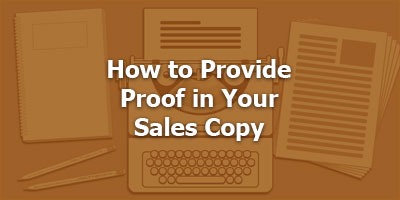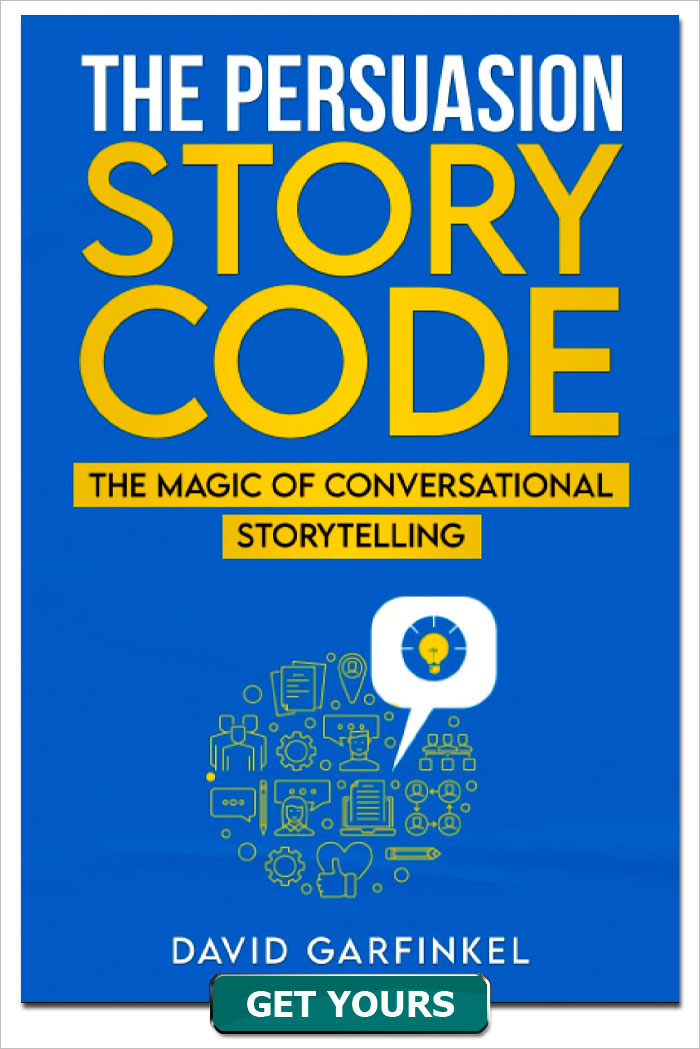Episode 009 - How to Provide Proof in Your Sales Copy
Published by: David Garfinkel on 06-19-2017
Tweet
When you watch a show on TV like “Law and Order” or “NCIS,” the detectives are mighty impressive. They efficiently rule out innocent subjects and nail the killers – all inside of 60 minutes!
And how do they do it?
First, by doing hands-on, smart research.
And then, using what they learn to develop convincing proof …
… to solve the case and nail the perpetrator.
Now… copywriters are usually not called upon to solve murder cases. But we still need to be just as thorough and convincing, in proving the claims that we make in our copy.
First I’d like to say something about what you’ll hear today:
Copy is powerful. You’re responsible for how you use what you hear on this podcast. Most of the time, common sense is all you need. But if you make extreme claims… and/or if you’re writing copy for offers in highly regulated industries like health, finance, and business opportunity… you may want to get a legal review after you write and before you start using your copy. My larger clients do this all the time.
Good thing we got that covered, huh?
Now, onto the subject of today’s podcast.
You may be wondering… why is proof so important?
What’s the big deal about proof, anyway?
Here’s what: Once you sit down to write your copy, there’s a big difference between how much you believe what you’re saying, and what a real prospect will believe.
People are naturally skeptical, and rightfully so. On a scale of 1 to 10, your belief level in what you’re saying may be a 10. But your prospect may have a belief level of a 7… or a 5… or even a 2.
If this upsets you, stop taking it personally. Now. Because this is human nature. People lose more sales arguing with, or trying to change, human nature than just about anything else. They’d be much better off learning the laws of human nature and following them, even if those laws are unfamiliar, even uncomfortable, at first.
You need to deal with people as they are, and the fact that people are skeptical and often untrusting, even when you might think they shouldn’t be, is just something to learn to live with.
So, that, in a nutshell, is why we need proof. You’re best off starting by assuming that the prospect has no reason to believe you. Even if you think they should! So, do the right thing and give your prospect plenty of reasons!
This episode covers different types of proof that work in copy. Some that you may already be familiar with, and some that you may never have heard of before.
Let’s start with:
• Testimonials and case studies
This category includes quotes from others about you, your company, your product, and sometimes even the idea that your product represents – and, stories about customers using your product, or service – and what their experience was like.
Big warning: Be very careful about reporting results. Especially financial and health results. I’m not a lawyer so I can’t give you expert or specific advice here. The general rule is to use disclaimers to let people know results are not typical or guaranteed. But if you are going to use testimonials or case studies with results, you’d be wise to consult with a lawyer who really knows advertising law – what you can get away with and what you can’t.
The examples I’m giving you are safe, because no reasonable person could expect they will get the exact same results, or even comparably similar results, to the ones I’m sharing. They are examples that show my capabilities, and how my coaching and critiques have increased the capabilities of my clients.
- Why proof elements need to include both emotional and logical components
- The purpose of proof is to overcome skepticism and resistance. Proof by itself doesn’t sell, but it greatly bolsters the sale.
1. Testimonials – three types: customer results testimonials, customer experience testimonials, expert testimonials
For the examples in this episode of Copywriters Podcast, I’m going to use testimonials, case studies, and reviews from my own website, Garfinkelcoaching.com. Because I already have permission to use those testimonials. You need to get permission to use testimonial quotes, and written permission is best.
o Customer results testimonials
from Brett Alcorn, an internet marketer, on copy critiques:
“I’ve worked with David twice so far and will continue to do so. On one promotion, David’s small but meaningful changes increased conversions of my sales video by 139.43%. As I said before, I intend to continue working with David and would encourage anyone else to as well. His expertise is well worth the investment.”
Comments:
- Specifics:
- Brett mentions he has worked with me twice so far
- “small but meaningful changes”
- 139.43% increase in conversions
- His conclusion: work with me again (he’s hired me 20 times)
- Any prospect who measures their results and wants better results –
o Can relate
o Would be interested
o Customer experience testimonials (describe)
From Chris Haddad, a/k/a Michael Fiore, who many now consider a legend in the digital marketing industry.
“Before I met David Garfinkel I was a wet-behind-the-ears wannabe copywriter way more concerned with protecting my ego than I was with writing copy that CONVERTS. David took me under his wing, brutalized my copy, burned away the bullshit keeping me from reaching that next level and transformed me into a world-class writer with well over 9 figures in sales to my name.”
Comments:
- he talked about his experience
- future mentoring clients can identify with Chris’s situation at the beginning of his testimonial
- To this day, Chris reaches out to me when he needs some outside clarity on a situation. He actually did so a few days ago, this week. That conversation is private so that’s all I’ll say about it.
o Expert testimonials
From Guerrilla Marketing author and former big Ad Agency exec Jay Conrad Levinson
“David Garfinkel is the best copywriter I know.”
Comments:
- I think the quote speaks for itself
- The expertise/authority of Jay is massive. He is one of the best known authors, if not THE best known, author of small business marketing books. And he was Sr. VP for a well known ad agency, J. Walter Thompson. So surely he must have known a lot of other copywriters.
Why testimonials work: People like to hear about experiences from others so they can compare that to what they want. Best of all, they like to hear it “right from the horse’s mouth.” That what a reference is. But a testimonial is the next best thing.
2. Customer Results Case Studies (describe)
o From my Professional Copywriting mentoring page
One of my mentoring clients, “Million Dollar Mike” Morgan, wrote a sales letter for Agora Financial that has the highest customer value in the history of the company. Another client, Angie Lole, wrote a VSL that rose to the number-two position in ALL of Clickbank. My client Jim Clair is writing copy for a group of digital fitness products that bring in eight figures a year. And his income is significantly higher than it used to be.
Comments: These are one-sentence case studies that spotlight accomplishments of some of my most successful clients. The kind of accomplishments others would like to aim for.
3. Product/company history (describe)
• The experience and effort that went into creating the product
- Example: iCoffee coffee-maker.
Sum-up: The importance and necessity of proof.
Next episode: How to get started on your copy. Even when you have no idea where to start.
Keywords: proof elements testimonials case studies company history









